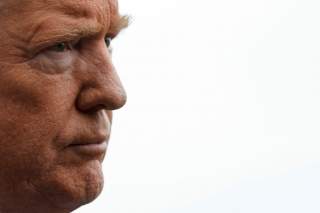Donald Trump’s State of the Union Opportunity
An ensemble of characters is trying to pull Trump in different directions at this critical juncture of his presidency.
The president of the United States enters the House chamber Tuesday night with manifold constraints on his power and interlocutors galore seeking to shape the remainder of his term. As John Bolton, national security advisor, told Politico this week: “So you have a choice. You can serve in the government or you can stand outside. My view is: For the privilege of this job, I am willing to take my losses along with the wins.”
For foreign-policy realists, there is a sense that this could be their moment. In his second State of the Union—and third major address to Congress—President Donald Trump could craft his remarks to center on a U.S. withdrawal from Syria and a pullback from Afghanistan. Taliban officials and the Afghan opposition will be in Moscow as he speaks: this is a prime opportunity for a major shift and to provide clarity on weeks of seemingly contradictory statements from his administration. It could be a bold sequel to his 2017 speech outlining an Afghanistan mini-surge in 2017, a move the president himself in the address admitted he wasn’t really for. The speech is often referred to as a “hostage tape” in policy circles. If Trump goes for broke on Afghanistan, and/or Syria, then he’ll have covering fire.
In addition to the vociferous Rand Paul, a source familiar with the senator’s thinking tells me Ted Cruz could offer a supporting speech in the following hours and days; Cruz has flirted with foreign-policy realism before, but also, like much of the anti-establishment right, he has ties to Frank Gaffney and his Center for Security Policy.
Hawks, on the other hand, have a different idea for the address. The administration is on a near war-footing when it comes to Venezuela. “All options are on the table,” Vice President Mike Pence told a roaring crowd of Venezuelan exiles in Florida last week. A pullback from Syria and Afghanistan could be brokered in exchange for a more aggressive posture in Latin America—or on Iran. Bolton’s yellow-pad insinuation of five thousand U.S. troops to Columbia isn’t helping matters.
Neither is President Trump’s statement that the United States must stay in Iraq to “watch” Iran, an offhand comment that has garnered Trump near-universal opprobrium in the Iraqi political establishment. Trump also recently pulled out of the INF missile treaty with Moscow. “The U.S. withdrawal from the Intermediate-Range Nuclear Forces (INF) Treaty is unfortunate but not the disaster many analysts make it out to be,” Benjamin H. Friedman of Defense Priorities said. “Since the U.S. and Russia possess more than 90 percent of the world’s nuclear weapons, it is in America’s security interest to improve U.S.-Russia relations and continue arms control efforts, especially by negotiating an extension to New START, an important arms control agreement which is set to expire in 2021.”
Whatever he says, it’s a closely guarded secret. With the president’s schedule—chock full of executive time—leaking to the press, Team Trump is sparing no precaution. A source inside the re-elect effort told me he was not briefed in depth, after expecting to be; he says, after being handed an embarrassing defeat by House Speaker Nancy Pelosi, to expect the unexpected.
Likely: the address will be a full-throated enunciation of the administration’s prerogatives on immigration. Here too, outside forces are trying to make it in. Retired Col. Douglas Macgregor, a favorite of Fox host Tucker Carlson, was on the program Friday floating his plan to aggressively militarize the U.S. Southern border, a solution to the border imbroglio he claims the president clear has the authority to enact—all on his own. “He doesn’t need special permission, he has the constitutional authority to act as the commander in chief. He doesn’t need any help from Congress at all,” Macgregor, who has been considered for national security advisor by the administration before, told Carlson. A plan to this effect, authored by Macgregor, is making the rounds in administration-friendly, conservative media circles. But a former White House senior official warns of an iron check on how far Trump will go. “Javanka have him in group hug,” referring to Jared Kushner and Ivanka Trump. “But he lays out the case for [a] national emergency.”
Curt Mills is a foreign-affairs reporter at the National Interest . Follow him on Twitter: @CurtMills.
Image: Reuters

